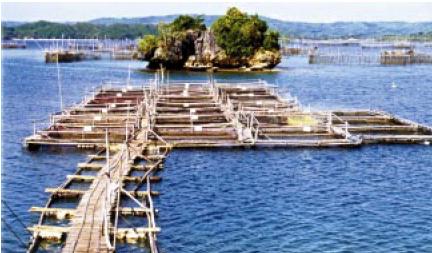|
Site Selection
The site should:
- Be in calm water, e.g. sheltered lagoons, coves, inlets, bay, behind an island or
a river mouth. This is to avoid damage caused by strong winds, waves and currents.
- Have salinity ranging between 20-30 pt for juveniles and 25-35 ppt for adults
- Have a temperature should be between 26-32oC and dissolved oxygen (DO)
above 4 ppm
- Have a pH of 7-9 or slightly alkaline and water transparency higher than 3 m
- Have water depth not less than 3 m during lowest low tide
- Have good water exchange to maintain good water quality and ensure effective removal
of wastes and adequate supply of dissolved oxygen
- Allow at least 1-2 meter distance between the bottom net cage and the seabed during
the lowest tide water level
- Be relatively free from any source of pollution (industrial, agricultural and domestic)
and protected from any environmental hazards such as typhoons, floods, erosions,
etc. It must be accessible and preferably secured from vandals and poachers.
Layout design of cages
Net cages used for grouper culture can be either floating or fixed type. A floating
cage module is usually composed of 4-12 compartments supported by a framework.
Cage Dimension: The net cages
vary in sizes depending on the financial capability of the fish farmer, but the
most manageable and economical sizes are 2m x 2m x 1 m, 3m x 3m x 1.5m and 5m x
5m x 2m.
Cage Shape: Since the shape
of net cages does not affect the mobility and growth of the cultured groupers, the
square or rectangular shape is mostly preferred than the circular shape because
it’s easier to assemble and managed.
Cage Frame: Made of bamboo
or wooden planks. They must be durable enough to withstand stress caused by wave
action and increased weight during culture operation.
Catwalks: Attach lumber measuring
1 in by 6 in (cross section) and 6 m in length to the framework.
Sinkers: Use small concrete
blocks as sinkers suspended by ropes, placed at the bottom of the 4 corners of the
cage or cage module for rigging.
Floaters: Use plastic drums
as floaters on each side of the cage between the bamboo pipes. Tie the drum to the
cage frame using a rope 5 mm in diameter to stop the drum from drifting, especially
during strong wave action.
Cage netting:
Fish net requirement for grouper cage culture
|
Growing Stage
|
Fish body length
|
Mesh Size
|
Net type
|
|
Fry
|
2-3 cm
|
2-5 mm
|
B-net
|
|
Fingerling
|
8-12 cm
|
1-2 cm
|
B or G net
|
|
Under Size
|
15-20 cm
|
2-3 cm
|
Super G net/PE knotted net
|
|
Good Size
|
25-30 cm
|
3 cm
|
PE knotted net
|
Nets are fabricated like an inverted mosquito net (hapa). Each cage is supported
with polyethylene rope (5 mm diameter) inserted along the sewed borders of the net
and held using a clove hitch with overhand knot. Each cage should have double-layered
nets to avoid loss of stock due to tearing and other mechanical damages.
Anchor: The rope length from
the floater to the anchor should be the same as the water depth at high spring tide.
The raft structure needs 14 concrete blocks (0.5-1 ton each) with 8 plated at the
ebb end (ebb tide being stronger than flood tide), 4 at the flood end and 2 in the
mid-section. Generally, the weight of the anchor should be twice the weight of the
entire floating cage module.
Shelter: Groupers need a place
to hide, unlike other fish. To provide a place for groupers to hide, use sawed-off
bamboos, 5 cm in diameter and 15 cm in length (for nursery cages) and 10 cm in diameter
and 30 cm in length (for grow-out cages) tied in triangular bundles and suspended
in strategic areas inside the net cage. Install a 50-watt incandescent lamp (hover
type) inside the cages, about 0.5 m above the water line, at night to attract live
food such as mysids, copepods and other smaller fishes. After 2 months in the nursery
net cages, the fingerlings (8-10 cm body length) are transferred into the grow-out
net cages. During the grow-out operation, the stocking rate is reduced when the
fish reach the given body weight. Give trash fish at a rate of 5 % of the average
body weight every 2 days.

Net cages
Top
|